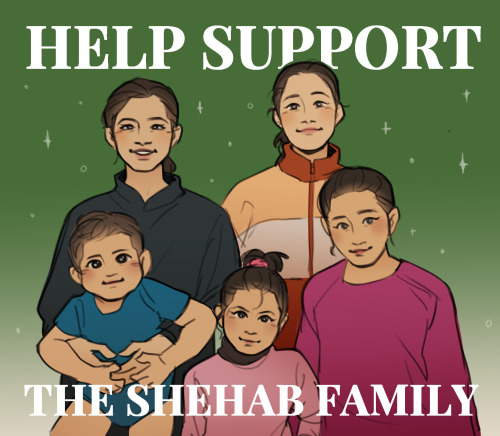I Love Her Dearly

i love her dearly
More Posts from Thewalkinglamppost and Others

@danashehab has been fundraising since may and is just over €15,000 away from their goal l. as stated in the screenshot people are starting to believe the rafah crossing will open so it’s important to make sure everyone has the funds in case they are allowed to evacuate.
thee shehab family consists of dana (13), sahar (14), mona (9), malak (5), yehya (1.5), fahed, (38), reem (32), and grandmother mona (60). they have been shadowbanned and deleted a few times. you can also find this family at @monashehab
EDIT AUG 24:
The family has had to raise their goal to cover their extended family’s evacuation fees since they are unable to make a new GFM.
The new goal is €85,000.


[vetted]
Some analysis about Steve.
English is not my native language and I cannot guarantee that I am professional
Attachment Theory
Developed by John Bowlby and Mary Ainsworth, attachment theory posits that early relationships with caregivers shape an individual's emotional bonds and sense of security (Bowlby, 1969). Caregivers, typically the mother or primary caretaker, provide psychological safety, enabling infants or children to confidently explore the world and return for comfort and support when needed. During this period, the mother serves as the child's primary "secure base," a primal instinct that persists into later life, extending to friends and loved ones in adulthood.
In Captain America, Steve Rogers' pre-serum life is depicted as frail, socially marginalized, and frequently bullied. His childhood friend, Bucky Barnes, emerges as Steve’s primary attachment figure, offering protection and affirmation. Scenes of Bucky shielding Steve from bullies and encouraging his resilience establish Bucky as a "secure base," a reliable source of safety that fosters exploration and resilience (Ainsworth, 1989). These early interactions cultivate a relatively secure attachment in Steve, characterized by trust and emotional reliance on Bucky. Notably, the model suggests early experiences shape enduring expectations of caregiver reliability.
Steve’s attachment deepens through shared trauma during World War II. In *Captain America: The First Avenger*, Bucky’s capture by Hydra and Steve’s rescue mission at Azzano solidify their mutual dependence. Bucky’s fall from the train, presumed fatal, triggers Steve’s grief response, aligning with Bowlby’s concept of "separation distress," where the loss of an attachment figure disrupts emotional equilibrium.
Steve’s initial reaction to Bucky’s fall—staring in disbelief at the spot where he vanished, later drinking alone in a bombed-out bar—signals acute separation distress, a hallmark of attachment loss (Bowlby, 1969). Bowlby’s theory outlines grief stages following attachment loss in childhood: protest, despair, and detachment. Steve’s protest phase manifests in his refusal to fully accept Bucky’s death, telling Peggy Carter, “I should’ve grabbed him” (Johnston & Markus, 2011), reflecting guilt and a desire to undo the loss. The despair phase is evident in his withdrawal and self-sacrificial act of crashing the Valkyrie into the Arctic, suggesting Bucky’s absence diminished Steve’s sense of purpose. Unlike typical detachment, Steve’s grief is interrupted by 70 years of cryogenic preservation, leaving him in an unresolved state of loss, later manifesting as chronic grief.
Steve’s subsequent self-sacrifice—crashing the Valkyrie—reflects an internalization of Bucky’s absence, as Steve’s identity is deeply tied to their shared past. In *Captain America: The Winter Soldier*, discovering Bucky alive but brainwashed reignites this attachment. Steve’s refusal to fight Bucky on the helicarrier, stating, “I’m with you to the end of the line,” reveals an enduring attachment bond, driven in part by a desire to restore the security Bucky once provided.
Erik Erikson’s theory of "identity formation" further explains Steve’s attachment. Erikson posits that identity develops through relationships and social experiences, particularly during crises. Steve’s pre-serum identity as a “little guy from Brooklyn” is inseparable from Bucky’s support. In Erikson’s eight-stage theory, the fifth stage (adolescence, ages 12–18) is critical, with the core conflict being *Identity vs. Role Confusion*. In *Civil War*, Steve’s defense of Bucky against Tony Stark and global authorities reflects an identity crisis: abandoning Bucky would betray the self that Bucky helped shape. Thus, Steve’s attachment is not only emotional but existential, anchoring his sense of continuity in a disorienting post-war world.
Existentialism
From an existentialist perspective, Steve’s attachment to Bucky aligns with Jean-Paul Sartre’s concept of authenticity, which involves embracing the freedom and responsibility to define oneself (Sartre, 1943). Steve views Bucky as a touchstone for his authentic self—the Brooklyn kid fighting for justice, not America’s icon. In *The Winter Soldier*, despite Bucky’s transformation into the Winter Soldier, Steve recognizes him, reflecting a refusal to accept the “nothingness” of Bucky’s lost identity. Sartre’s notion of “existence precedes essence” asserts that humans first exist and then define their essence through choices and actions. Steve believes Bucky’s essence—his goodness—persists beneath Hydra’s conditioning, driving his actions. This is evident when Steve drops his shield, choosing vulnerability over combat to reach Bucky’s buried self.
Steve’s persistence also resonates with Martin Heidegger’s “being-toward-death,” which suggests confronting mortality sharpens one’s purpose (Heidegger, 1927). Bucky’s death and Steve’s near-death experiences (the Valkyrie crash, the helicarrier battle) bind them in a shared existential outlook. For Steve, Bucky represents a living link to a past intertwined with death and meaning. In *Civil War*, Steve’s fracturing of the Avengers to protect Bucky underscores this existential commitment, viewing Bucky not as a threat but as a symbol of life and values worth preserving.
Phenomenology
Maurice Merleau-Ponty’s phenomenology, emphasizing intersubjectivity and embodied perception, illuminates how Steve’s perception of Bucky shapes their bond (Merleau-Ponty, 1945). Steve’s view of Bucky is rooted in their shared lifeworld—a pre-war Brooklyn defined by loyalty and mutual care. In *The Winter Soldier*, Steve gazes at the masked Winter Soldier and pleads, “You know me,” an act of phenomenological recognition. Merleau-Ponty posits that the self is constituted through the presence of others: “I am not in front of my body, I am in it, or rather I am it.” The self emerges through interactions with others’ gazes, words, and actions. Steve’s embodied memories of Bucky—their shared past—override the Winter Soldier’s programming, evident in Bucky’s hesitation to kill him.
In Civil War, Steve and Bucky’s reunion in Bucharest further embodies this intersubjective dynamic. Despite global accusations, Steve refuses to see Bucky as a weapon, reflecting a phenomenological affirmation of Bucky’s living humanity. Their physical cooperation against authorities embodies a pre-reflective trust, what Merleau-Ponty describes as the fundamental “coexistence” of human connection. Thus, Steve’s attachment is not abstract but visceral, grounded in the bodily and emotional reality of their shared past.
“Phenomenological identity” refers to an understanding of identity from a phenomenological perspective, distinct from traditional psychological or sociological categorizations (e.g., gender or cultural identity). It focuses on how one experiences and confirms “I am me” through lived interactions with the world and others. For example, identifying as “a little guy from Brooklyn” is not a mere label but emerges through how Steve treats others, how they respond, and how he feels “this is me” in those interactions. For Merleau-Ponty, the body is the medium of world interaction, and relationships are rooted in shared bodily practices. For Steve and Bucky, their pre-war Brooklyn life and wartime camaraderie—marked by physical gestures like Bucky’s arm around Steve’s shoulder, fighting side by side, and trusting glances—are disrupted by Bucky’s fall, leaving Steve with an inner void.
In The First Avenger, Steve clutches a glass of liquor in a bar, unable to get drunk due to his super-soldier metabolism, embodying this loss. His enhanced body, unable to save Bucky, amplifies the pain of separation (Merleau-Ponty, 1945). This phenomenological trauma persists into *The Winter Soldier*. Steve’s body—running, punching bags until they burst—externalizes his inner pain, a futile attempt to reclaim the intersubjective rhythm shared with Bucky. Merleau-Ponty’s concept of “intercorporeality”—the co-constitution of selves through bodily presence—explains the significance of Steve’s reunion with Bucky. Seeing Bucky alive, even as the Winter Soldier, reawakens Steve’s embodied memories, expressed in his desperate plea, “You know me” (Wadlow & Markus, 2014). Thus, separation distress is not abstract but a disruption of Steve’s bodily being-in-the-world, a longing for the tactile and perceptual presence Bucky once provided.

The series reminded me why I fell in love with Fallout all those years ago
MY SON NEEDS A SURGERY FOR HIS BRAIN ‼️‼️💔
Hello, im ashraf azmi, im a father of a young man called ‘JAD ASHRAF AZMI’✅
Jad is a 9-year-old boy and the only child of his parents, their big dream was to have a baby after 7 years of marriage full of struggles and health problems, they had almost given up on the idea of having a child, but then JAD came and filled their lives with joy and happiness, he was a very smart kid, great in his studies, and loved by his friends and family.
But one day, while playing like usual, he suddenly felt dizzy and nauseous, then threw up and fainted, his parents quickly rushed him to the hospital, where they got a shocking surprise🚨💔the doctors discovered that JAD had irregular and strong electrical charges in his brain.
From that moment on, the family’s life changed completely, and JAD’S treatment became their top priority, they started an expensive treatment journey, they bought high priced medicine and even had to borrow money from relatives to cover the treatment costs, but unfortunately, the treatment wasn’t effective, and his condition worsened, he began suffering from daily, chronic seizures, which made it impossible for him to go to school or live his normal life🥹💔🚨
After some time, the doctor in charge of his case decided that the only solution was immediate brain surgery to remove the seizure focus, with a 99% success rate, this was the only option because JAD’S brain was not responding to the medication that kept his condition stable, the surgery, along with hospital and doctor fees, costs $45,000, which is a huge amount for his family, who are already facing financial pressure. Now, JAD needs your help.
Every donation, no matter how small, can give JAD a new chance at a better life and bring back his smile, JAD is the future, and he is his family’s hope that they cannot give up on, help JAD go back to school and live his childhood with joy and hope. DO NOT IGNORE THIS ‼️‼️‼️‼️‼️









Just a spark
Monkey King with fire and curses in his blood.
~☆◇Prints◇☆~▪︎~☆◇Commissions◇☆~▪︎~☆◇Kofi◇☆~▪︎~☆◇My Game on Steam◇☆~▪︎~☆◇For inquiries: ichimakes@gmail.com◇☆~


➤ "I have been away far too long." ➤ "Loki will go. Atreus... Atreus remains."

So I know the event is @catws-anniversary but this is actually one of my favourite Steve-Bucky scenes.
There's been a lot spoken about their seamless teamwork here -- Steve doesn't even look in Bucky's direction when he tosses the shield at Bucky -- but there is just...so much packed into this fluid cooperation?
Bucky as far as we know in CATFA was a sniper (although in the supporting material it does say Bucky learned boxing before he joined the army). It's only when we get to CATWS we see him being a strong melee fighter. A lot of Bucky's new fighting style takes into account his metal arm -- he favours it for blocking and forceful striking to spare his flesh arm. He's also spent most of his recent decades doing mostly solo work. He had backup support during CATWS to get him into position, but actually on task? He's by himself chasing down his targets.
This is the first time Bucky fights on Steve's side after his time as the Winter Soldier. Depending on how you headcanon Bucky receiving his serum, this would also be the first time Steve treats Bucky as an equally strong super soldier. Bucky's experience, fighting style, physical constitution have all significantly changed since the last time they were on the field together, not to mention Steve's own style and experience have evolved.
Yet they slotted straight back into each other's space, like they had never spent a minute apart in the last 70 years. Apart from the "end of the line" spell-break, nothing else speaks such volumes about their bond.
(Also goddamn CEvans with that beautiful pirouette. No wonder the stuntspeople say they can't replicate his footwork)
-
 phantomspider liked this · 1 week ago
phantomspider liked this · 1 week ago -
 gay4h0pepunk liked this · 1 week ago
gay4h0pepunk liked this · 1 week ago -
 myfrecklesboy liked this · 1 week ago
myfrecklesboy liked this · 1 week ago -
 rouvenge liked this · 1 week ago
rouvenge liked this · 1 week ago -
 ashly3 liked this · 1 week ago
ashly3 liked this · 1 week ago -
 crayolascentedclown liked this · 1 week ago
crayolascentedclown liked this · 1 week ago -
 rackunkagain liked this · 1 week ago
rackunkagain liked this · 1 week ago -
 effypcfc liked this · 1 week ago
effypcfc liked this · 1 week ago -
 porcelanitas liked this · 1 week ago
porcelanitas liked this · 1 week ago -
 mscreepy liked this · 1 week ago
mscreepy liked this · 1 week ago -
 kirpichq liked this · 1 week ago
kirpichq liked this · 1 week ago -
 dookieschmirtz liked this · 2 weeks ago
dookieschmirtz liked this · 2 weeks ago -
 nighthoneyyy liked this · 2 weeks ago
nighthoneyyy liked this · 2 weeks ago -
 aissadraw liked this · 2 weeks ago
aissadraw liked this · 2 weeks ago -
 leeyixuan2013 liked this · 2 weeks ago
leeyixuan2013 liked this · 2 weeks ago -
 tracercheers liked this · 2 weeks ago
tracercheers liked this · 2 weeks ago -
 world-8311 liked this · 2 weeks ago
world-8311 liked this · 2 weeks ago -
 gaybiann liked this · 2 weeks ago
gaybiann liked this · 2 weeks ago -
 teeth317 liked this · 2 weeks ago
teeth317 liked this · 2 weeks ago -
 degenerata69 liked this · 2 weeks ago
degenerata69 liked this · 2 weeks ago -
 yourlovelyjanedoe liked this · 2 weeks ago
yourlovelyjanedoe liked this · 2 weeks ago -
 clowncults liked this · 2 weeks ago
clowncults liked this · 2 weeks ago -
 maxboythedog liked this · 2 weeks ago
maxboythedog liked this · 2 weeks ago -
 number1namgyufan liked this · 2 weeks ago
number1namgyufan liked this · 2 weeks ago -
 ryukiethebored liked this · 2 weeks ago
ryukiethebored liked this · 2 weeks ago -
 sunshinereddie liked this · 2 weeks ago
sunshinereddie liked this · 2 weeks ago -
 celestial-loner reblogged this · 2 weeks ago
celestial-loner reblogged this · 2 weeks ago -
 transvalkilmer liked this · 2 weeks ago
transvalkilmer liked this · 2 weeks ago -
 14ssonicscrewdriver liked this · 2 weeks ago
14ssonicscrewdriver liked this · 2 weeks ago -
 betsyacidrainbow reblogged this · 2 weeks ago
betsyacidrainbow reblogged this · 2 weeks ago -
 betsyacidrainbow liked this · 2 weeks ago
betsyacidrainbow liked this · 2 weeks ago -
 ziwhavxu liked this · 2 weeks ago
ziwhavxu liked this · 2 weeks ago -
 shiisiln reblogged this · 2 weeks ago
shiisiln reblogged this · 2 weeks ago -
 shiisiln liked this · 2 weeks ago
shiisiln liked this · 2 weeks ago -
 its-0n-like-d0nkeyk0ng liked this · 3 weeks ago
its-0n-like-d0nkeyk0ng liked this · 3 weeks ago -
 kyungseist liked this · 3 weeks ago
kyungseist liked this · 3 weeks ago -
 lion-hardt liked this · 3 weeks ago
lion-hardt liked this · 3 weeks ago -
 interabangs reblogged this · 3 weeks ago
interabangs reblogged this · 3 weeks ago -
 crafolt reblogged this · 3 weeks ago
crafolt reblogged this · 3 weeks ago -
 crafolt liked this · 3 weeks ago
crafolt liked this · 3 weeks ago -
 umidays liked this · 3 weeks ago
umidays liked this · 3 weeks ago -
 qtheineffable liked this · 3 weeks ago
qtheineffable liked this · 3 weeks ago -
 xoxolilacxo liked this · 3 weeks ago
xoxolilacxo liked this · 3 weeks ago -
 wifeyhyunju reblogged this · 3 weeks ago
wifeyhyunju reblogged this · 3 weeks ago -
 bloomsoulss liked this · 3 weeks ago
bloomsoulss liked this · 3 weeks ago -
 following-the-dopamine liked this · 3 weeks ago
following-the-dopamine liked this · 3 weeks ago -
 koreanthrillerenjoyer reblogged this · 3 weeks ago
koreanthrillerenjoyer reblogged this · 3 weeks ago -
 koreanthrillerenjoyer liked this · 3 weeks ago
koreanthrillerenjoyer liked this · 3 weeks ago

Ash|24|Taurus🥀Slowly rotting, decaying, and coming back to life all over again🥀|Artist|
229 posts











